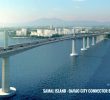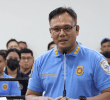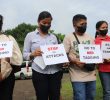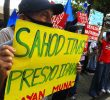DAVAO CITY — The Bangsamoro development plan is consistent with the national development plan “that is anti-Moro and pro-foreign (investors),” a Moro group has claimed.
“It is clearly stated in the BBL (proposed House Bill 4994 or the Bangsamoro Basic Law) Section 13 that the Bangsamoro development plan shall (be) consistent with national development goals,” said Suara Bangsamoro Spokesperson Jerome Succor Aba.
In his keynote address during the Philippine Development Plan on Bangsamoro Thursday, President Benigno Aquino III said that the impact of efforts could already be seen in the Autonomous Region of Muslim Mindanao (ARMM).
“In just the first nine months of 2014, they registered a yearly all-time high of P3.37 billion in investments. This is more than double the P1.46 billion in investments recorded in 2013, and almost six times the P569 million in investments ARMM received in 2012,” said Aquino before a crowd of more than a hundred Moro leaders, government officers and donor agencies.
Aquino said “ARMM’s GDP has likewise been on an upswing, from a contraction of 0.3 percent in 2011, to a growth of 1.2 percent in 2012, and a growth of 3.6 percent in 2013.”
“I am told that the growth of 5.6 this year is very attainable,” said Aquino.
Aquino said that Japan, China, Korea, and other members of the Brunei Indonesia Malaysia Philippines – East Asia Growth Area (BIMP-EAGA) “have drastically increased, from 18 in 2012, to 37 in 2013, and to 51 in just the first ten months of 2014.”
“On top of this, we have heard of plans to expand and diversify from several companies from vastly different industries—from energy, to coconut products, to palm oil, and various other consumer products,” he said.
But Aba said “these investments in ARMM Aquino talked about is the mining in Tawi-Tawi and the planned banana and oil palm plantations in Maguindanao owned by local elites and foreign companies”.
“ARMM remains to be the second poorest region in the country and they are fooling the Bangsamoro that such reforms are effective,” Aba said.
Meanhile, Aquino said that the “(g)overnment has likewise been active in expanding the menu of opportunities for our countrymen in conflict-ridden areas.”
Aquino said the Sajahatra Bangsamoro program offering cash for work, technical vocational training, study grants, and health insurance premiums, amongst others give several Bangsamoro communities “the necessary skills and services to take advantage of opportunities that arise, and to allow them to win back control of their destinies.”
“We are confident that the Bangsamoro Development Plan can be harmonized with these efforts, and build on the progress we have made at the soonest possible time,” he said.
The BDP has a 32-page primer posted in the website bangsamorodevelopment.org which contains specific programs that Aquino also mentioned.
The full BDP version was not provided to the media, as the PDF was a closed-door meeting.
Aba said, however, that the services are “palliative solutions and that the Moro people are still being deprived of their right to education, health and other social services.”
“The government is privatizing basic services and like what is being done now to the Cotabato Regional Hospital and Water District and state universities. The Sajahatra scholarship will not suffice,” he said.
Aba and other members of progressive group protested the PDF during Aquino’s speech calling it a “sellout of the Bangsamoro land.”
In an earlier statement criticizing the BBL, Suara said “that the hard won victory of the Moro Islamic Liberation Front (MILF) for the recognition of Bangsamoro identity and territory will be diminished if not gone.”
“The fate of the Bangsamoro people for a self-ruling territory hangs depends too much on the decisions of President Aquino and its Liberal partymates,” said the group.










